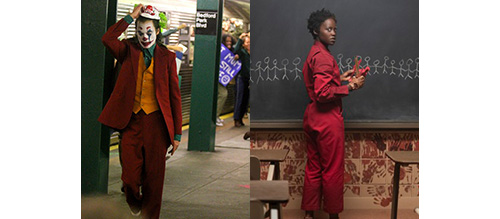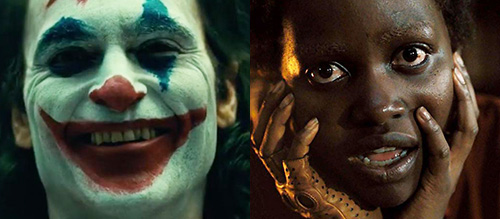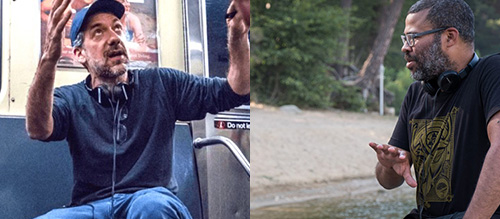‘Joker’ Vs ‘Us’: Their Significance, Similarities – And Why Is One Missing From The Oscar Nominations?
This article was written exclusively for The Film Magazine by The CineBlog’s Sophie Butcher.
Awards season is upon us once again, and so too is the discourse around who has, hasn’t and should have been nominated.
The BAFTA and Oscar noms have caused the most dismay – white actors nominated twice at the expense of the inclusion of people of colour, the distinct lack of Jennifer Lopez in the Supporting Actress category for Hustlers, Little Women apparently directing itself, and, largely, the same safe films sweeping the board.
One of the biggest surprises – depending on what you thought of the film, of course – was Todd Phillips’ Scorcese-lite Joker topping the list at the Academy Awards, receiving eleven nods in total. The surprise here lies in the fact that Joker is, in many ways, not a traditionally Oscar-winning type of movie – despite Black Panther making an impact last year, featuring heavily in the technical categories and receiving a nomination for Best Picture, films based on comic books were unable to break into the major acting, directing and screenplay categories until now.
And Joker is, well, strange. It’s dark, horrifying at times, feels more like an addition to the crime or thriller genre than true-story Oscar bait – and for many (myself included), really not deserving of its enormous box office takings or showering of awards praise.
A film that feels sadly left out of the awards conversation is Jordan Peele’s second feature Us, a landmark in the film calendar back in March. It had all the visionary stamps of excellence we’d come to expect from the director after his debut, Get Out, became a cultural phenomenon – and, most importantly, it matches (and in some cases exceeds) the achievements of Joker when it comes to the very things that the Clown Prince’s origin story was nominated for.
Joker Suit Vs. Jumpsuit
Joker has been Oscar nominated in both the Costume Design and Makeup & Hair categories, and it’s easy to see why; the image of Joaquin Phoenix’s Arthur Fleck with bold green hair, sad smile painted roughly across his lips, and kitted out in a suit of clashing reds and oranges is the most memorable thing about the film. This updated Joker look has inspired many a tattoo, makeup tutorial, and Insta-star flocking to this set of steps to get the perfect shot for the ‘gram.
It’s undeniable that the image of this new Joker has reached full cultural penetration, but the character design in Us is arguably just as iconic. The Tethered’s red jumpsuits, fingerless leather gloves and metal scissors made a huge impression from the moment the world saw the first poster, and after the film’s release (and box office success), director Peele was inundated with people sharing their Halloween costumes based on their look.
There was more to Kym Barratt’s costume design on Us than just the jumpsuits – even Adelaide’s all-white outfit became synonymous with imagery from the film, as did the way it was increasingly blood spattered throughout, bringing her closer and closer to the red clothing of her doppelgänger.
Joaquin Vs. Lupita
The gong that has seemed most nailed on for Joker from the start was for Joaquin Phoenix’s lead performance.
That Phoenix signed up for this film at all was curious, but the way the actor transformed himself to vanish into the troubled Arthur Fleck, and the singular intensity he brought to the role meant that the critical applause for him in particular was inevitable. In Joker, Phoenix is the most thin and gaunt we’ve ever seen him, ribs and spine protruding, and he embodies Fleck with equal amounts of mania and grace – plus, the screeching chimes of his uncontrollable laughter rings in your ears for days.
But if physicality is what determines Phoenix’s nomination, then the fact Lupita Nyong’o has been overlooked for her work in Us is even more baffling. Starring in two roles – protagonist Adelaide and her Tethered self, Red – gives her the opportunity to bring two distinct performances. The way she expresses Red’s character through movement is astonishing; her walk that is more of a scuttle, the way she taps her fingers across her face as she holds it in her hands, and how she drops her voice into the low, husky tone of a woman who has been silenced for so long.
There’s more to both performances than the way they look or move, but the complexity of each feels equal. Phoenix’s success at the Oscars so far looks somewhat like that of Leonardo Dicaprio’s prior to his win for The Revenant – this is his fourth time nominated, but he hasn’t won yet – whereas Nyong’o scooped up Best Supporting Actress for her first major role in 12 Years A Slave. Her previous win made it seem all the more likely she would be recognised, and the fact that the Academy has yet again only nominated a Black woman for a role related to slavery (Cynthia Erivo in Harriet) makes Nyong’o’s omission all the more frustrating.
In terms of Peele’s filmography, Daniel Kaluuya did receive a Best Actor nod back in 2018 for his stunning lead performance in Get Out – but again, whilst the iconic horror isn’t necessarily a period piece depicting slavery at its peak, it is still a film about the entitlement White people assume over Black bodies, and its entire construct is highly racially charged. Us stars Black people, and clearly has a lot to say about social issues, but its story isn’t hinged on race in the same way – and in the eyes of the Academy, must seem somehow less worthy in order to disqualify Nyong’o from so much of the conversation.
Phillips Vs. Peele
Todd Phillips may have caused quite a stir by sharing some controversial opinions in interviews since the release of Joker (for example, how he thinks ‘woke culture’ has killed comedy), but it doesn’t seem to have affected his success with the Academy. As well as the overall recognition for the film, Phillips himself has been nominated for Best Director, and his writing for Best Adapted Screenplay.
These are curious accolades to potentially award him. Phillips is best known for douchey bro comedies like The Hangover, which could have limited how seriously the Academy considered him – but, you’d be hard pushed to find a review of Joker that doesn’t cite its obvious Scorcese influences, and in a year where films by legacy directors like Tarantino and Marty himself have swept the board, Phillips’ obvious homage may have worked as a point in his favour. Whilst his previous work certainly doesn’t disqualify him from the conversation, it does make you wonder why Jordan Peele hasn’t been a bigger part of it. Peele is undoubtedly one of the strongest filmmaking voices of his generation, a true visionary whose work so far has not only given us some of the best Black representation of recent years, but also scathing and authentic social commentary.
Comparing Peele and Phillips in terms of their screenplay also begs the question as to what makes the latter so worthy of recognition where the former is not. Joker comes under the Adapted Screenplay category only because the character and his world is already established, but Phillips himself has said that they didn’t base the script on anything from the comic books. His screenplay is shockingly uneven at times and annoyingly on-the-nose at others, and the way it links violence and mental illness is stigmatising and problematic.
Peele’s work on Us would fall under the Original Screenplay category, for which he won the Oscar in 2018 for Get Out. In this second feature script, Peele brings his concept to life in a way that is darkly humorous, entertaining, and much more effective in making a statement about class than the lonely-white-guy-turned-murderer vibe at the centre of Joker. Even looking back at Get Out‘s Oscar success, it beggars belief why a piece of cinema so incisive, timely, intelligent and groundbreaking received only four nominations, whilst Todd Phillips’ reimagining of the Joker walks into the ceremony with eleven.
There are other areas in which these films are comparable, making the two more alike than we might immediately think. Hildur Guðnadóttir’s astonishing score for Joker is perhaps the least contested of all of its nominations, an ominous rumbling of cellos that perfectly soundtracks Arthur’s slow descent into madness – but how can we forget Michael Abel’s chilling reimagining of ‘I Got 5 On It’, which was added to Us to such stunning effect at the last minute? Lawrence Sher’s cinematography is another of the most impactful elements of Joker, all turquoise tones and a swaying camera, capturing Fleck’s balletic dancing – but so too is Mike Gioulakis’s work on Us, with that overhead shot of the family walking across the sand, or young Adelaide bathed in blue in the house of mirrors being just two moments that spring to mind.
The argument here isn’t that Us should have been nominated instead of Joker, that either they both should be present or neither, or that other nominees shouldn’t have made the cut – there’s no real correct answer at all. What matters are the questions – why did Joker resonate so deeply with audiences despite a more mixed reception by critics, and why did Us seemingly have the opposite effect? Why is one gaining so much awards recognition, while the other receives none at all? Is it because the Academy bowed to box office pressure? Or, the theory that they would surely deny, because Black-led films like Us are judged differently?
Perhaps this is all down to marketing; Joker hit screens right in the run-up to the Oscar sweet spot, whereas the release of Us back in March feels like a distant memory – though an earlier release didn’t do Get Out or Black Panther any harm. It’s hard to gauge how much money Universal put behind Us in terms of a ‘For Your Consideration’ campaign in comparison to the support for Joker at Warner Bros, but regardless of PR specifics, maybe we should be demanding a more thorough approach from the Academy (Carey Mulligan has the right idea). If the nominations became more about digging a little deeper into the films of the past year and truly finding the best of them, instead of responding to movies based on the efficacy of their advertising campaigns, perhaps we’d be talking about a much more diverse and representative set of nominees right now.
We can’t know for sure, and we won’t even know if Joker manages to actually win anything until February 9th. Regardless, awards don’t mean everything, and only time will tell what kind of lasting impact these two films will have on the landscape of cinema. For what it’s worth, I know which one I’ll be rewatching for years to come – in fact, I would happily never have to hear ‘Send In The Clowns’ again.




